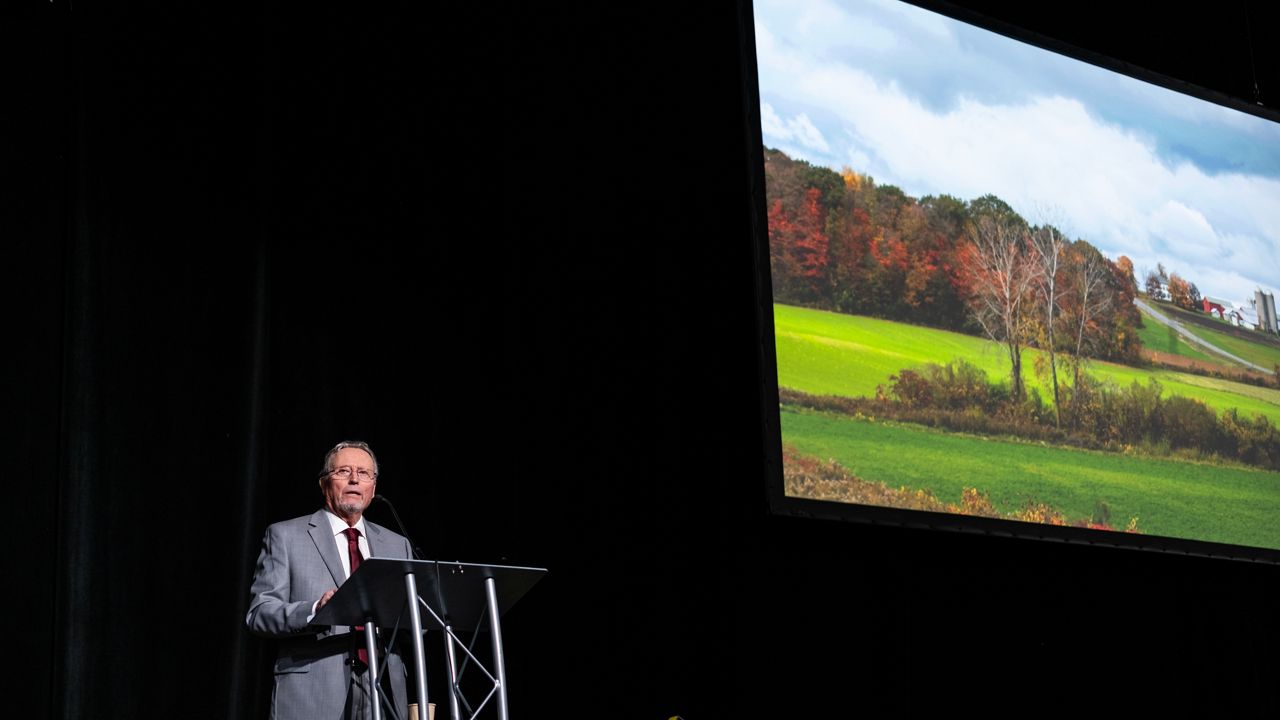New York farmers faced many challenges in the past year, including severe weather, inflation and changes to the farmworker overtime threshold, but Commissioner of Agriculture Richard Ball said he is cautiously optimistic going into 2024.
“There’s a lot of uncertainty but I like our chances because farmers in New York have proved over and over again we’re resilient. When we take a beating or have a climate problem, we’ll be back. We’re not done,” Ball said Thursday at the annual gathering of the New York Agricultural Society in Syracuse.
He highlighted some of the benefits New York farmers have such as being in the top 10 for over 30 different commodities, the land grant education system through Cornell University, water resources and the world’s biggest marketplace at the state’s doorstep.
While Ball said during his State of Agriculture speech that he is excited about these things, there are a few things that keep him up at night.
“Farm finances, profit and loss statements, figuring out how to take a lifetime of farming lessons, some of them pretty hard lessons, then translating them to the next generation on the farm and finding ways to ensure the farm provides a viable way for our family to make a living,” said Ball, who also owns a vegetable farm in Schoharie County.
However, he said Gov. Kathy Hochul’s support for New York farmers has been crucial. She proposed $34 million for dairy farmers to increase on-farm fluid milk storage in her State of the State Address earlier this week, and an additional $21 million for waste storage and precision feeding systems.
“Supporting that infrastructure, where do we need the support? We need it in manufacturing and food processing here in New York state. We have to make sure our dairy farmers have a place to go and that there are products that can be made with milk,” Ball said.
But, Natasha Sutherland, a co-owner of Stein Farms in LeRoy, said the price of a milk tank is about $12 to $15 per gallon in size and that $34 million is only a drop in the bucket to cover New York dairy farms.
“Our next raw milk storage tank will be a 10,000-gallon silo, estimated to cost $120,000 for just the silo, not the chiller, the plumbing or electrical components. The $34 million promised, divided by two for two years, that is 140 farms per year that the state will help. There are 3,200 dairy farms in this state,” Sutherland said.
Additionally, Sutherland highlighted that processors won’t take milk after two or three days.
Allyson Jones-Brimmer, vice president of regulatory and legislative affairs for Northeast Dairy Producers Assocation, said despite the expenses she is excited that the governor is supporting dairy farms.
“I think what’s important right now is that there is some focus and excitement around these ideas. We really want to be a partner with the state government in figuring out how to best use those funds and how the implementation can best benefit New York’s farm families,” Jones-Brimmer said.
Hochul proposed a partnership with Cornell University’s Agricultural Workforce Program that aims to help bridge the gap between farmers and farmworkers, and an additional $1 million in funding for the New York Center for Agricultural Medicine and Health to support farm safety programs.
“We want to build it up and make it do more to address the problems in the workforce,” Ball said.
Richard Stup, director of the program at Cornell University, said the goal is to promote retention of farmworkers.
“We often work with farmers and farm employees to create a better work environment, so people want to stay in those workplaces,” Stup said.
Hochul also has proposed a youth leadership council and expanding agricultural education.
“We need to ensure we have a strong future workforce that has the knowledge and the tools to grow, harvest, transport, store and market the products that we need for our population in years to come and that starts with agricultural education,” Ball said in his address.
The average age of the American farmer is 57.5 years old, according to data from the USDA.
“We don't see enough young people, it’s a common story across the country. We don’t see the next generation coming on, so we need to address that,” Ball said.
He highlighted the Future Farmers of America program throughout the state, which encourages youth to get involved in agriculture.
“We’ve got to redouble our efforts here to make sure that more kids realize there’s a future in the food system. There’s a future in agriculture,” Ball said.



